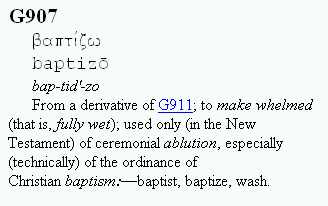Baptism: Should It Be Performed By Immersion, Sprinkling or Pouring Study Notes
This bible study addresses questions concerning the mode of baptism. Whether we need to be baptized by immersion, sprinkling or pouring.
In some circles sprinkling is referred to as aspersion, pouring is referred to as affusion and immersion is referred to as dunking. I will refer to aspersion as sprinkling, affusion as pouring and dunking as immersion.
While there are these 3 different modes of baptism accepted by some today, history tells us that sprinkling and pouring were not widely accepted until around 1311 A.D.
The early church practiced baptism by immersion only and the first departure we have recorded in history from the practice of immersion was around 251 A.D.
The question then arises: Is the mode of baptism is really important.
We should remain scriptural in our practices, for to deviate from scriptural practices is a dangerous practice that will cause many to be lost because they do not see the significance of following scriptural practices. We need to follow scriptural practices because they can and do affect or salvation.
You cannot find New Testament support for sprinkling or pouring, but you can find support for immersion.
In Romans chapter 6, Baptism is referred to as a burial with Christ.
Jesus was entombed or immersed in the stone sepulcher (Matt. 27: 66).
"Therefore we are buried with him by baptism into death: that like as Christ was raised up from the dead by the glory of the Father, even so we also should walk in newness of life"
Rom. 6: 4 (NKJV)
The writer of Colossians also declares we have been buried with him in Baptism:
buried with Him in baptism, in which you also were raised with Him through faith in the working of God, who raised Him from the dead.
Col. 2: 12 (NKJV)
NOTE: Sprinkling or pouring does not constitute a burial. When a person is buried we do not sprinkle a little dirt on them, we completely cover them with dirt.
To be buried with Christ in the waters of baptism constitutes a complete covering with water.
John the Baptist practiced baptism by immersion.
Now John also was baptizing in Aenon near Salim, because there was much water there. And they came and were baptized.
John 3:23 (NKJV)
While the writer of the Gospel does not specify the mode of baptism, when Jesus was baptized of John in Mat 3:16 the scripture declares he went up out of the water
When He had been baptized, Jesus came up immediately from the water
Matthew 3:16 (NKJV)
How is that possible if they were sprinkled or poured on, there’s no water to come up out of in those instances.

The Greek word for Baptism itself explains what the mode of baptism should be:

Pouring or sprinkling does not make one fully wet nor does they constitute a burial
Another instance is found in Acts 8:36-39 where Philip baptized the Ethiopian eunuch.
36 Now as they went down the road, they came to some water. And the eunuch said, “See, here is water. What hinders me from being baptized?” 37 Then Philip said, “If you believe with all your heart,you may.” And he answered and said, “I believe that Jesus Christ is the Son of God.” 38 So he commanded the chariot to stand still. And both Philip and the eunuch went down into the water, and he baptized him. 39 Now when they came up out of the water, the Spirit of the Lord caught Philip away, so that the eunuch saw him no more; and he went on his way rejoicing.
Acts 8:36-39 (NKJV)
The scriptures tell us they went down into the water where Philip baptized him.
QUESTION: If sprinkling or pouring was the practice of the time, the why did both Jesus and the Ethiopian eunuch go into the water?
You see pouring or sprinkling was not the practice of the time but came later is history and was one of the things the Apostle Paul warned of when he preached that false teaching would come into the church.
Does it matter if you’ve been sprinkled or poured upon when you were baptized?
QUESTION: Does sprinkling or pouring constitute a burial with Christ? NO
QUESTION: If you have not been buried with him can you possibly rise to walk in newness of life? NO
If sprinkling or pouring was not practiced by the early church but came later, why should we practice something that was not sanctioned by Jesus himself, because he went into the water, and he understood the significance.